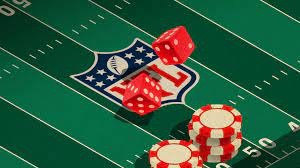the growth of sports betting

The thrill of making money from picking the right team is tantalizing, so much so that
people are willing to put everything they have into a game which they don’t know the outcome
and where the odds are against them. Over the past half dozen years legalized online gambling
has formed a silent partnership with professional sports and become the right-hand man to the
professional sports world. Gambling has driven up engagement and revenue for both the leagues
and the bookmaking companies. But how has this affected individuals and our society, and how
did we go from a society that viewed sports betting as a disease and a crime to one which
appears to have accepted online gambling as another productive high-tech industry?
The Unlawful Internet Gambling Enforcement Act signed by George W. Bush in October
of 2006 banned gambling companies from taking money through the internet. At the time this
law was passed gambling was a crime nearly everywhere in the U.S. With the exception of Las
Vegas and Atlantic City, the “gaming industry” was operated and controlled by the same types of
mobsters and criminal organizations that controlled, prostitution, loansharking, illegal drug and
similar vice “industries”. As a result of rapid growth of the internet at the turn of the century,
offshore online gambling sites were gaining in popularity and were viewed as a threat to laws
generally banning gambling throughout the United States.
The 2006 Unlawful Internet Gambling Enforcement Act was intended to eliminate the
threat posed by offshore internet gambling sites. However, in attempting to eliminate one threat
the government inadvertently opened another. The law, banned wagering on games of chance,
however it did not ban wagering on games dependent upon a player’s skill, such as fantasy
football, this would prove to be the game changer. As a result, the popularity of fantasy football
exploded, and many people, including kids of all ages, were introduced to online gambling
through fantasy football.
Fan Duel broke onto the scene in 2009. Fantasy sports were deemed as games of skill not
chance, rendering the fan duel an online fantasy football app legal. Fan duel wasn't just a way to
bet with your friends, you could play against people all around the world picking a new team
every week. You could play games wagering as little as one dollar or as much as a thousand
dollars. Within a year of its introduction Fan Duel had their first million-dollar winner. With
this exponential Fan Duel became very profitable.
As a result of its ability to slip under the online gambling ban enacted by the Unlawful
Internet Gambling Enforcement Act, Fan Duel was the trojan horse which gave rise to the online
gaming industry we see today. The free-flowing nature of Fan Duel was clean and fun and was
seen as harmless to people who generally viewed gambling as a vice. In 2011 Fan Duel
partnered with the NBA. Its competitor, Draft Kings signed partnership deals with the NHL and
major league baseball. For the first time, we saw mainstream gambling being thrust into every
sport.
The explosive growth in fantasy sports betting was due to a few key factors: cheap buy-
ins; ease of use; and low sense of risk; but most of all the growth of fantasy sports betting was
fueled by the iPhone. No longer did you have to travel to a casino or contact and illegally place
a bet with a bookie. The iPhone was with you 24/7 and made betting on sports quick, easy and
subject to impulse.
Critics started to question the differences between fantasy sports betting and traditional
(illegal) betting on a game. At this time sports betting had been banned in every state except
Nevada. In 2006 56 percent of Americans disproved of sports betting and viewed gambling
with a bookie as a dirty vice shadowing legitimate sports. Many viewed gambling similar to
illegal drug use, while it was the user's choice to use drugs it was the drug itself that kept them
hooked leaving behind terrible repercussions.
By 2017 only 33 percent of Americans opposed gambling. Many viewed the ban on
gambling as causing as much harm as it was preventing. With the demand for sports gambling
strong large amounts of money was being bet illegally through mobsters and bookies, which
were seen as having a corrupting influence on sports. In the early 2000s there were multiple
point-shaving incidents and a huge incident involving a NBA referee who became deeply in debt
through illegal gambling and was fixing games for the mob. The American Gaming
Commission estimated that Americans were betting 150 billion dollars a year on sports, with a
small percentage going through legal means in Nevada.
With Americans opinion shifting and state governments eyeing a source of additional tax
revenue, the ban on sports gambling was finally overturned in 2018. Today sports betting is
everywhere. It is estimated that 30 percent of Americans bet on the NFL every year. Gambling
has now become an integral part of sports culture.
Why is it so addicting and why has it exploded? First is the enjoyment of the game. One
of the reasons fantasy football works so well is because fantasy football makes games for teams
you are not a fan of have actual stakes. Each time you win when betting the brain releases a
chemical called dopamine which is a “reward” chemical in the brain. But with each win, it
becomes harder and harder to achieve the same boost, causing you to bet more frequently and in
greater amounts. The feeling of losing is the hardest part, especially in sports, where there is a
lack of control and the odds are in your favor. When presented with a loss, you either accept the
loss or try and win it back with another bet. This endless cycle is how people get deeply in the
hole. Secondly, with gambling, there's an illusion of safety and a huge upside. Every better
dreams of hitting that huge bet and walking away with a million dollars.
Humans are terrible at assessing risk, especially young adults, who tend to be impulsive
and often don’t consider the negative consequences of their decisions. Half of the people who
bet on sports fall between ages 21 and 30. The growth of gambling has also been fuel by the
introduction of gambling at young age through fantasy sports betting.. I remember when Fan
Duel came out my friends on my street were all using it they had set it up through their parents
and had used their allowance to place small 1 to 3-dollar bets. I feel that this is one the reasons
that we saw a 7 billion dollar increase from 2019 to 2023 as the generation who had used fan
duel as kids finally came to age.
As a result of legalization of online sports betting, within less than a generation, gambling
in the U.S. has been transformed from a dirty vice run by bookies and mobsters, to the “gaming
industry” controlled by venture capitalist and corporations, with minimal government regulation.
As is the case with drugs and alcohol, gambling poses an inherent conflict between individual
freedom and what is good for society as a group. During the past 15 years the U.S. has moved
from prohibiting gambling to promoting and taxing it as a legitimate industry. As this industry
grows, and my generation ages, the negative effects of unregulated legalized gambling will
become increasingly clear. For now what once was a dark shadow of American sports now is the
front center and tied to every game, every play, and every call.

Post a comment